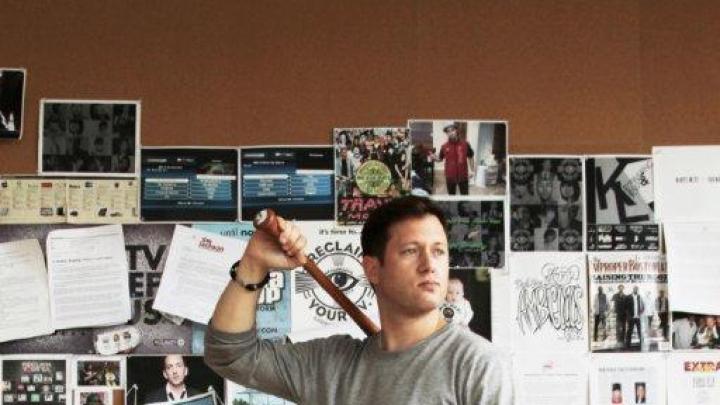Training in urban planning, an obsession with city niche cultures, a degree in anthropology from Rollins College: not a typical background for a major retailer in the clothing industry. Furthermore, until age 29, Greg Selkoe, M.P.P. ’05, lived in his parents’ home (with his wife, Dina Selkoe, J.D. ’00, his partner in the business) and was mailing out orders from their basement even years after starting Karmaloop.com in 2000. Today, the enterprise is one of the 50 fastest-growing Internet companies in America: it grossed $75 million in 2010, $100 million in 2011, and is on track to take in $200 million this year. Selkoe himself is a nominee for a 2012 Ernst & Young Entrepreneur of the Year Award; past winners include Jeff Bezos, Steve Jobs, and Bill Gates ’77.
Karmaloop sells clothes online, dealing with an 18-to-35-year-old, mixed-gender, market; its 300 suppliers are manufacturers, not boutiques, and their brand names include Cheap Monday, Kazbah, Brick Harbor, and Loser Machine Company. The words GLOBAL CONCRETE CULTURE rest atop the company name; its customers might be characterized as members or fans of skateboard culture, hip-hop, DJ culture, indie rock, or—Selkoe’s favorite—“verge culture.” “The convergence of many cultures…and on the cutting edge,” he explains. “Verge culture represents at least 20 percent of American kids.”
“I believe in the whole aesthetic and outlook,” says Selkoe, who posts his own cell-phone number on the Karmaloop website. “It’s a multiracial, multiethnic group that is socially engaged; they tend to be entrepreneurs themselves; they want the coolest, newest stuff and are turned on by learning things, by the Internet, by technology. It’s a hopeful subset of a generation that has been maligned as being lazy or uninterested—this group is the exact opposite of that.” At 37, Selkoe, a family man with a young daughter, smiles and says, “I’d like to consider myself an honorary member of the 18-to-35 year-old group.” (His collection of 500 pair of sneakers may qualify him; he jokes that he’s “the male American Imelda Marcos.”)
Selkoe radiates restless energy; he cannot sit still for long and has always been an entrepreneur who launched projects like a restaurant guide to Jamaica Plain in Boston, where he lived with his parents. Karmaloop.com, “another cockamamie scheme,” began on the heels of the dot.com bust of 2000, and “a lot of people thought I was crazy,” he recalls. His day job then was in urban development and planning, working for the City of Boston’s board of appeals in City Hall—which he did for four years, thinking his career would be in urban development, a field he still cares passionately about.
He had a partner who considered Karmaloop a “fool’s errand” and sold out to Selkoe early for $10,000. The business had no access to venture capital until 2008 (when they got a $35-million infusion), and so made do with angel investors—including his father, Coates professor of neurologic diseases Dennis Selkoe—who collectively put in $3.5 million as the fledgling firm struggled through its early years, nearly failing several times.
Yet Karmaloop’s core premise was sound. Selkoe had discerned something that others missed. In 1999, while selling ads for a friend’s DJ-culture zine, “we noticed these emerging underground clothing lines,” he recalls. “But most towns in America had only Old Navy, Gap, or Banana Republic stores. At the same time, a lot of celebrities, skaters, heroes of the culture like [hip-hop artists] Common and Mos Def were wearing these brands—they had terrific brand recognition. So I called them up and said, ‘You must be doing great—I’d like you to buy an ad in this DJ zine.’ They said, ‘We don’t have any money.’ So I would ask, ‘How can that be? With all these celebrities wearing your stuff?’ And the answer was, ‘Those people all live in New York or L.A. If you don’t live there, you can’t get this stuff.’
“That was the genesis of the idea,” Selkoe explains. “The celebrities were creating all this buzz. You had these clothing brands with incredible visibility and demand—you could see that on Internet message boards, and kids were fanatically following these clothing lines the way collectors collect baseball cards. Even so, there was very limited supply; there were no resellers so you just couldn’t get hold of these brands. But the Internet provides universal reach; at that time [around 2000], there was beginning to be e-commerce. Amazon existed. Dot.com startups were going under, but I always believed the Internet would get faster and more prevalent. Catalogs have existed for 100 years; an Internet catalog is more dynamic, more exciting, and more efficient.” Reality has borne out Selkoe’s vision; Karmaloop broke even about five years ago and has since taken off. The company has become so successful that he now invests in other ventures, typically those of young entrepreneurs like the one he was only a few years ago.

















